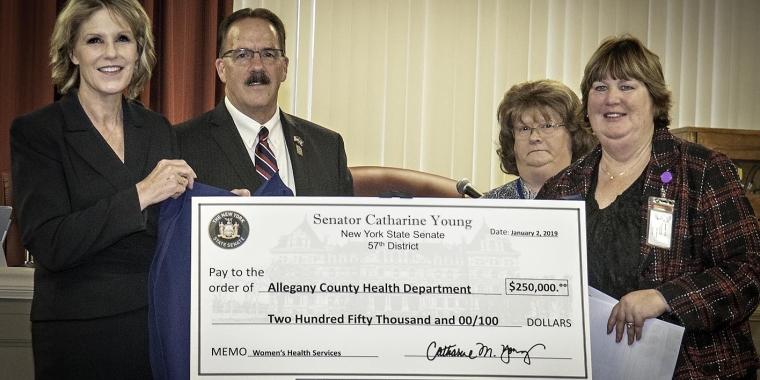
Legislation To Fix Late STAR Payments Passes The Senate
ALBANY –Senator Catharine Young’s (R,C,I- 57th District) legislation that requires the State Department of Taxation and Finance to postmark all STAR Personal Income Tax (STAR PIT) credit checks in advance of September 15, to ensure that taxpayers receive their rebate with adequate time to pay their school tax bills, has passed the state Senate.
The bill also specifies that if the advance checks are not post marked by September 15, the state must reimburse taxpayers for interest and penalties imposed by the school district for late payment.
“New homeowners should not be penalized because the state’s system has changed and they now receive their STAR PIT credit as a rebate check instead. The rebate is supposed to be pre-paid to homeowners, but many hardworking property taxpayers have been frustrated with the delay, or lack of payment by the Department of Taxation and Finance. The state agency has a responsibility to provide relief for our overburden taxpayers and homeowners deserve to be compensated with interest if the state cannot meet its obligation,” said Senator Young.
“I have heard overwhelmingly from homeowners who have become frustrated by the slow disbursement of STAR PIT credit checks. The state needs to make sure homeowners are receiving their full benefits in a timely fashion. Hardworking taxpayers deserve this relief, and they should not bear the additional tax burden while the state holds on to their money,” Senator Young said.
Senator Young introduced the legislation to spur action from the Department of Taxation and Finance and to ensure that the failures experienced by customers this year are not repeated in the future. She has received more than 100 complaints from her constituents about the lateness of checks.
“I strongly urge the Assembly Majority to follow our lead and pass this important taxpayer protection measure,” said Senator Young.
Since the Senate first established the STAR program to provide significant savings for taxpayers, it has provided almost $60 billion in property tax relief to eligible homeowners. This year alone, total STAR benefits are estimated to be almost $3.4 billion. As part of last year’s state budget, the current STAR program changed for homeowners who purchased their primary residence after the 2015 STAR application deadline. Under the new rules, direct payments to school districts on behalf of eligible homeowners have been phased out and the STAR exemption has been converted into a refundable property tax credit for new homeowners.
